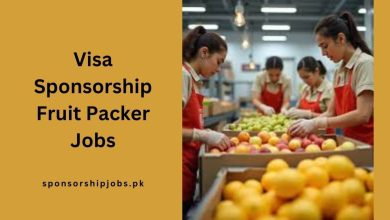Visa Sponsorship Food Production Worker Jobs in Poland 2025 – Hiring Now
Jobs in food production in Poland that will pay for your visa: A local company that makes food wants to grow its business by hiring people from other countries to work in its plants and food production facilities. You don’t need any training to join, and both men and women are welcome. People are needed to work directly on a production line or in an area used for production.
You will help get our goods ready for shipping, process them, pack them, or send them out. They will be given a visa, a competitive salary, a place to live for free, and all of their energy bills will be paid for. Find out more about jobs in food production in Poland that will pay for your visa by reading on.
Key Points:
- Job title: Food Production Worker
- Job Location: Warsaw, Poland
- Knowledge required: Very Basic
- Job Schedule: 10 hours shift for six days a week (Various Shifts Available)
- Experience required: Not high
- Expected Salary: Monthly salary: 5000-5500 PLN (≈900$-1000$)
- Work Schedule: Day shifts, 8-9 hours per day, five days per week
- Visa Sponsorship: Yes
- Employee Benefits: Yes
Check Also: Visa Sponsorship Snacks Cracker Packing Jobs in Poland
Requirements for Visa Sponsorship Food Production Worker Jobs in Poland:
- You don’t have to have work experience.
- No need to know anything.
- Must be able to stand for long periods of time.
- Must be able to handle too much work when it’s needed.
Benefits of Visa Sponsorship Food Production Worker Jobs:
- Official Permission to Live and Work in Poland: If you have a legal job offer and a visa sponsor, you are officially allowed to live and work in Poland.
- No College Required: Most of the time, these jobs only need basic skills, physical strength, and attention to detail. You don’t need a college degree to do them.
- Food production workers: make between PLN 3,200 and 5,000 a month, based on their experience, the type of shift they work, and any bonuses the company gives them.
- High Demand Across the Sector: The food processing business in Poland is growing, and there is a strong need for packers, machine operators, and quality assistants.
- Overtime and Night Shift Bonuses: Many food companies pay extra for working nights, weekends, and holidays. This can help you make more money overall.
- Free or Cheap Housing: Sponsored workers often get free or cheap housing from their employers, which makes the move easier.
- Paid Work Permits and Visa Help: Most of the time, employers handle or pay for work permits, visas, and residence cards, which makes it easier for people to move.
- Access to Polish Health Care (NFZ): Workers who are sponsored get health insurance and public health care perks.
- Way to Get Permanent Residency: If you have legal work for a few years, you can apply for temporary or permanent residency or even an EU Blue Card.
- No Language Barrier in Most Jobs: Many food companies hire foreigners who speak little or no Polish, and they often offer translation services or multilingual teams.
- Training and Job Skills: Even entry-level jobs offer training in safety and cleanliness, and you might even be able to learn how to run a machine or be a supervisor.
- Work with People from Different Cultures: Food factories in Poland often hire people from Asia, Africa, and Eastern Europe, which makes it easier for them to fit in.
- Visa-Free Travel Within the Schengen Area: Once you get your Polish residence card, you can go to more than 25 EU/Schengen countries without a visa.
- One type of support visa: lets you bring your spouse and children with you after a certain amount of stable work.
- Opportunities for Career Growth: If you work hard and put in the time, you can move up to higher-paying jobs like quality control assistant, shift boss, or machine operator.
Description of Visa Sponsorship Food Production Worker Jobs:
- All the tasks that go into processing food, like getting food, storing it properly, operating food processing equipment, keeping supplies stocked, mixing ingredients, and judging the quality of food.
- Clean up the room.
- Weighing goods and supplies and making sure there is a steady quantity of the ingredients.
- Must know how to put things into production, like putting items into machines that process them.
- Food packaging chores include putting food in boxes, bags, and other containers.
- Get the finished, high-quality boxes off the conveyer and put them back on the pallets.
- Checking tools like temperature gauges to make sure that the best conditions for production are met.
- Clean up tools and machinery and report any problems with them.
- Make sure that the standards for output are met.
- Finish the goods and get them ready to ship.
How to Apply for Visa Sponsorship Food Production Worker Jobs in Poland?
At Schengen, you can fill out a simple form to apply right away. Do Your Job
Conclusion:
Jobs as a food production worker in Poland are a great way for people from outside of Europe to start a stable career. People who don’t have much experience are especially interested in these jobs because they offer visa funding, help with moving, and housing. People who want to work in dairy, meat processing, or packaging can count on stable jobs, fair pay, and the chance to gain useful experience in a growing field.
Frequently Asked Questions:
How much do production workers make in Poland?
The average pay for a Factory Worker is PLN 57,640 a year and PLN 28 an hour in Poland. The average salary range for a Factory Worker is between PLN 43,749 and PLN 67,093.
What is the job description in food production?
A Food Production Worker is responsible for the production of food products in a safe and efficient manner. This involves following recipes and instructions, as well as operating machinery and equipment. The worker will also inspect and package food items and maintain the cleanliness of the workspace.
What is a food production worker?
Food production workers handle ingredients to create baked goods, prepare meat, poultry, and seafood products, work in slaughtering and meatpacking, and operate food and tobacco drying equipment. This group also includes confectionery and dairy product workers.



